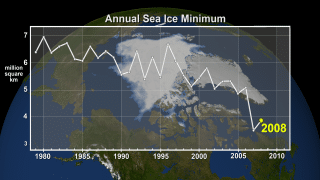The party’s over, we had us a time..
We burned all the kindling…
Watched the last coals dwindling
And the ice melting down…
Is the party over?
According to a new study by scientists at the NSICD (National Snow and Ice Data Centre), there’s a good chance that Arctic sea ice has melted beyond the point of no return.
Joseph Romm points us to a story in today’s edition of the UK’s Independent. The news is not good:
Scientists have found the first unequivocal evidence that the Arctic region is warming at a faster rate than the rest of the world at least a decade before it was predicted to happen.
Climate-change researchers have found that air temperatures in the region are higher than would be normally expected during the autumn because the increased melting of the summer Arctic sea ice is accumulating heat in the ocean. The phenomenon, known as Arctic amplification, was not expected to be seen for at least another 10 or 15 years and the findings will further raise concerns that the Arctic has already passed the climatic tipping-point towards ice-free summers, beyond which it may not recover.
Why is this report so important? Because:
The Arctic is considered one of the most sensitive regions in terms of climate change and its transition to another climatic state will have a direct impact on other parts of the northern hemisphere, as well more indirect effects around the world.
One of the researchers, Mark Serreze, summarizes Arctic amplification:
Even our early climate-change models developed in the late 1970s told us that the Arctic would suffer most from the surface warming that came with adding carbon dioxide to the atmosphere and that this would be intimately tied to the shrinking of its sea ice cover.
This is called Arctic amplification and when we look at our climate records, that is exactly what we see: the climate warming, with the strongest rises in temperature in the Arctic, and those rises linked to the loss of sea ice cover – just as projected 30 years ago.
So, Arctic amplification was predicted by models, and it is actually occurring, much earlier than expected. It is essentially a warning signal, if you will, of what will come, and that it will not be limited to the Arctic.
Finally, not to put too fine a point on it, Serreze’s colleague, Dr. Julienne Stroeve, is quoted by the Independent:
“One of the reasons we focus on Arctic amplification is that it is a good test of greenhouse warming theory. Even our earliest climate models were telling us that we should see this Arctic amplification emerge as we lose the summer ice cover,” Dr Stroeve said. “This is exactly what we are not starting to see in the observations. Simply put, it’s a case of we hate to say we told you so, but we did,” she added.
Are we looking at a future in which the Arctic is completely free of ice? Most likely, yes.
How soon? Well, if you have young children, it will be within their lifetime.
Guess those Christmas Arctic references will be limited to television specials.
Subscribe to our newsletter
Stay up to date with DeSmog news and alerts







